 |
 |
 |
 |
 |
 |
 |
 |
 |
 |
|
KICP Workshops & Events
|
Other Events, 2016 Physics colloquium: Stephan Meyer, University of Chicago, "First results from the Fermilab Holometer testing space-time correlations at the Planck scale" January 7, 2016 | 4:00 PM | KPTC 106 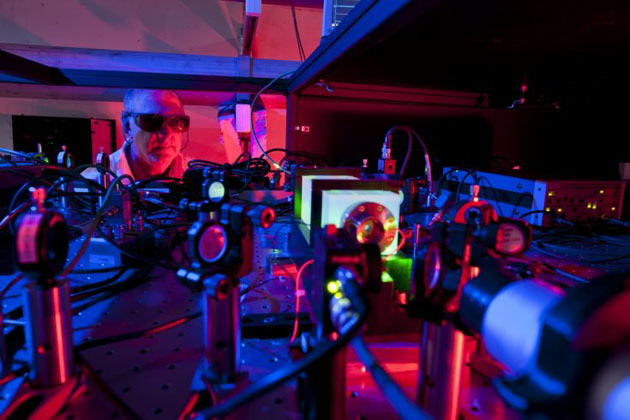 Related Links: KICP Members: Stephan S. Meyer 2015-2016 Brinson Lecture: Francis Halzen, "Ice Fishing for Neutrinos" February 9, 2016 | 6:00 PM | School of the Art Institute of Chicago, 112 South Michigan Ave., MacLean Ballroom Website Francis Halzen, 2015-2016 Brinson Lecturer Francis Halzen is a theoretical physicist who works at the interface of particle physics, astrophysics and cosmology. He is the Principal Investigator for IceCube, the world's largest neutrino detector, the Director of the Institute for Elementary Particle Physics, and the Hilldale and Gregory Breit Distinguished Professor at the University of Wisconsin-Madison. Among his recent honours are the 2015 Balzan Prize, the European Physical Society Prize for Particle Astrophysics and Cosmology in 2015; the Smithsonian American Ingenuity Award for Physical Sciences in 2014; the Physics World Breakthrough of the Year Award for making the first observation of cosmic neutrinos; and the International Hemholtz Award of the Alexander von Humboldt Foundation in Germany. 2015-2016 Brinson Lecture: "Ice Fishing for Neutrinos" IceCube is a strange telescope which looks down rather then up. It is located at the South Pole and it is BIG (a cubic kilometer) with eighty-six holes over 1.5 miles deep melted into the Antarctic icecap. IceCube recently discovered a flux of neutrinos reaching us from deep in the cosmos, with energies more than a million times greater then those humans can produce in accelerators. These energetic neutrinos are astronomical messengers from some of the most violent processes in the universe including: starbursts, giant black holes gobbling up stars in the heart of quasars and gamma-ray bursts, the biggest explosions since the Big Bang. We will explore the IceCube telescope, its recent scientific results, and working at the South Pole. This event is co-sponsored by the University of Chicago and the School of the Art Institute of Chicago. Read more >> Physics colloquium: Daniel Holz, University of Chicago, "Update on LIGO and Gravitational Waves" February 11, 2016 | 4:00 PM | KPTC 106 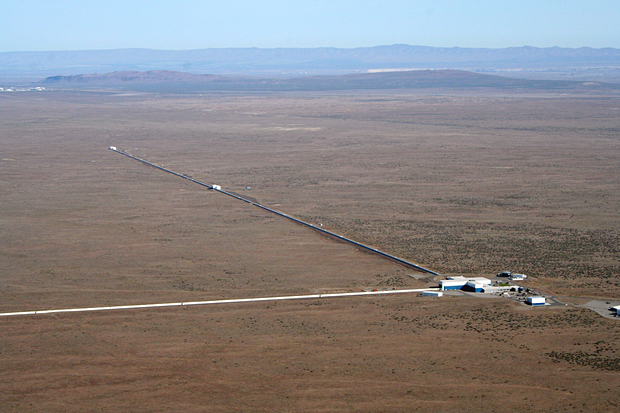 This year marks the 100th anniversary of the first publication of Albert Einstein’s prediction of the existence of gravitational waves. The advanced Laser Interferometer Gravitational-wave Observatory (LIGO) has been designed to search for these waves. We will provide an update. Related Links: KICP Members: Daniel E. Holz Physics colloquium: Scott Wakely, University of Chicago, "Isotope Hunting at 100,000ft: Tracking Cosmic-Ray Clocks with HELIX" February 25, 2016 | 4:00 PM | KPTC 106 Cafe Scientifique: Erik Shirokoff, "Using nano-scale devices at the South Pole to study the most distant objects in the Universe" March 28, 2016 | 7:00 PM | Map Room 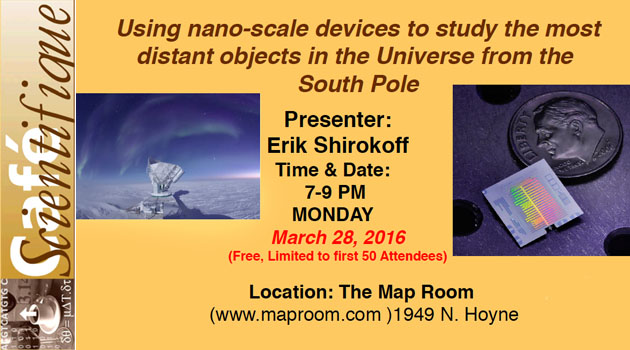 Related Links: KICP Members: Erik Shirokoff Broader Horizons: Joshua Carter, quantitative analyst at Citadel in Chicago April 7, 2016 | 4:00 PM | ERC 401 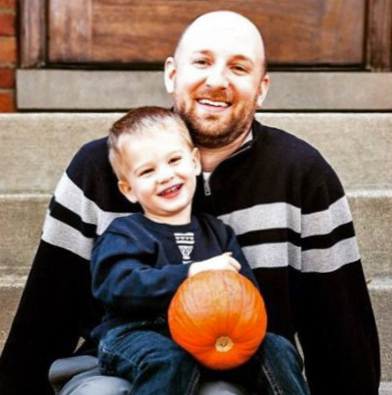 UChicago Conference: "Space: Speculation and Exploration" April 9, 2016 | 9:00 AM | International House Assembly Hall Website The University of Chicago's Conference titled "Space: Speculation and Exploration" is a day long event, hosting speakers from across the country. The conference aims to inspire public fascination and contemplation of the universe by connecting renowned professors and experts on space from various fields of science, economics, politics, and fiction with University of Chicago students and community members. KEYNOTE Robert Rosner- University of Chicago Professor in Astronomy and Astrophysics and Physics SCIENCE PANEL Jay M. Pasachoff- Williams College Professor in Astronomy Brian Fields- University of Illinois Professor in Astronomy Grace Wolf-Chase- Adler Planetarium Astronomer Zoltan G. Levay - Imaging Group Lead in the Office of Public Outreach at Space Telescope Science Institute Scott Sandford- NASA Astrophysicist BUSINESS AND POLITICS PANEL Eligar Sadeh- CEO of Astroconsulting Charles Blandchard- former General Counsel of the Air Force and the Army David Livingston- Host of The Space Show FICTION PANEL Eric S. Rabkin- University of Michigan Professor of English Language and Literature and Professor of Art & Design Robert J. Scherrer- Vanderbilt University Professor and Chair of the Department of Physics and Astronomy and science fiction blogger John Hemry- New York Times Best Selling Author of The Lost Fleet series Robert Buettner- National Bestselling Author of Jason Wander and Orphan's Legacy series Read more >> Related Links: KICP Members: Robert Rosner Joshua Frieman in the Deborah Stratman film "The Illinois Parables" April 14, 2016 | 6:00 PM | Gene Siskel Film Center Website For the last 25 years, Deborah Stratman (BFA 1990) has explored the landscape of our national history and psyche in riveting films, sculpture, sound, and public works. With THE ILLINOIS PARABLES, she turns her attention to the “American microcosm” and its storied past. Bracketed by sweeping aerial shots of the state’s ancient prairies and waterways, Stratman spins eleven tales of natural disaster, messianic devotion, technological breakthrough, government resistance, and unsolved mystery. Together, these stories ask how the systems of belief they represent have shaped how we see the land, ourselves, and our nation. 16mm. (Amy Beste) Read more >> Related Links: KICP Members: Joshua A. Frieman The World's Oldest Computer: The Antikythera Mechanis April 14, 2016 | 6:30 PM | National Hellenic Museum | 333. South Halstead Website More than 21 centuries ago, Greek scientists created a mechanism that used brass gearwheels to predict the movements of the sun, the moon, and probably most of the planets, essentially inventing the world's first computer. Found by Greek sponge divers in an ancient shipwreck, its corroded remnants, now known as the Antikythera Mechanism give us fresh insights into history and challenge our assumptions about technology transfer over the ages. Dr. John Seiradakis, Radio Astronomer and Physics Professor at the Aristotle University of Thessaloniki, Greece, will discuss the work of an international team of experts who used 21st century technology to decode the truth behind the world's first computer. This program will also feature the artwork of two local artists inspired by the Antikythera Mechanism: Terry Poulos and Keith Skogstrom. Read more >> Astronomy Conversations Training Session April 15, 2016 | 4:00 PM | Adler Planetarium 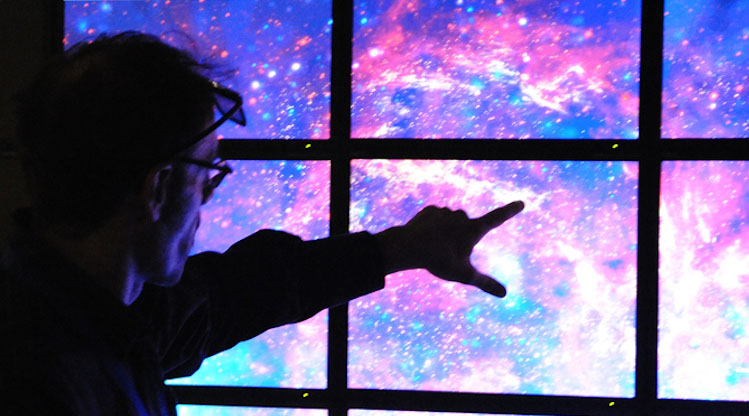 SVL and Astronomy Conversations Related Links: KICP Members: Randall H. Landsberg Chicago Astronomy on Tap April 18, 2016 | 7:00 PM | The Map Room 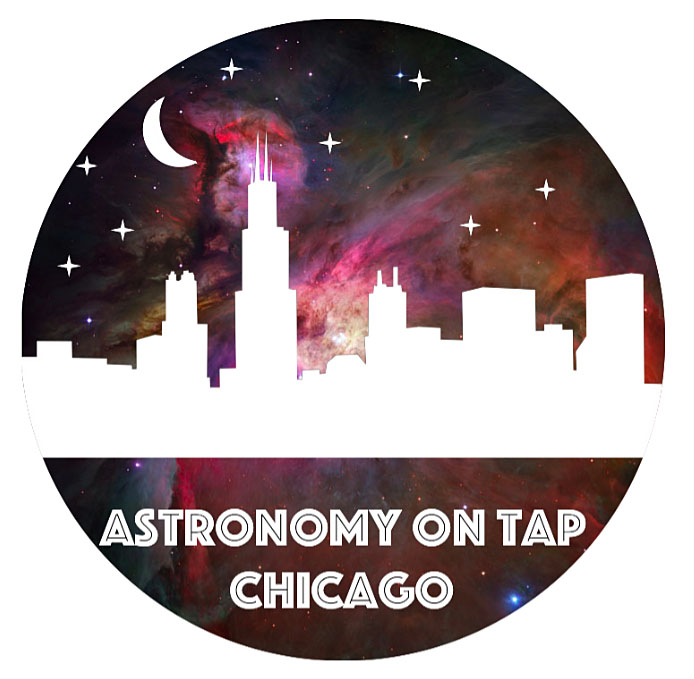 Astrophysics for Older Adults April 21, 2016 | 4:00 PM | ERC 401 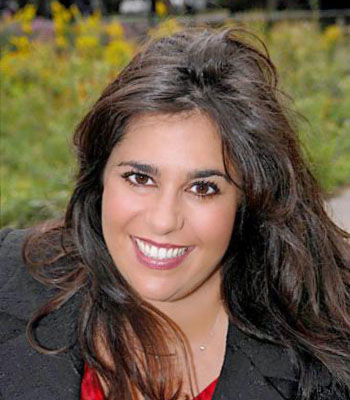 Beginning in 2013, the KICP has developed an astrophysics outreach effort to older adults (formerly known as senior citizens). This program has brought fundamental and cutting-edge content in astronomy to older adults at Chicago senior centers, retirement homes, and public libraries. The material has been presented by graduate students, postdocs, and faculty at the KICP, the University of Chicago's Astronomy/Astrophysics Department, Physics Department, and even broader pool including biologists at the UofC, as well as scientists at FermiLab, the Adler Planetarium, and the Field Museum. After briefly introducing the program, we'll cover how to effectively reach out to this audience. This event is a perfect entry point to participate in the program! After a ~1 hour presentation, participants will have an opportunity to present slides for critique and improvement, and discuss the program more informally. Related Links: KICP Members: Daniel Grin Kavli Lecture: Michael Turner, "From The Big Bang To The Multiverse & Beyond" May 5, 2016 | 7:30 PM | Adler Planetarium Michael Turner, Director of the Kavli Institute of Cosmological Physics and the Bruce V. and Diana M. Rauner Distinguished Service Professor at the University of Chicago WebsiteLecture Flyer [PDF] 7:30 pm - 9:00 pm: Lecture and Q&A Session 9:00 pm - 10:00 pm: Speaker Reception with Refreshments Presented by The Kavli Foundation The Kavli Foundation fulldome lecture will be streamed live at fourteen other institutions including the American Museum of Natural History (NY, NY), the Denver Museum of Nature and Science and the Pacific Science Center (Seattle, WA). This dome-cast will allow audiences across the country to immerse themselves in the presentation in real time and ask questions. We know the Universe began 13.7 billion years ago in an explosion of space called the Big Bang. We also know that the gravity of dark matter created the galaxies and other cosmic structures we see today from tiny quantum fluctuations that arose just after the Big Bang. Yet some big questions remain. Is our Universe part of a larger multiverse? What is speeding up the expansion of the Universe? These are the mysteries that inspire cosmologists today. In a dazzling, fulldome presentation, this presentation will illustrate what we know and how we know it, as well as the big ideas and puzzles of cosmology today. On May 5, the University of Chicago's Michael Turner will explore some of the biggest mysteries in modern cosmology. About Michael Turner Michael S. Turner is a theoretical astrophysicist and the Bruce V. and Diana M. Rauner Distinguished Service Professor at the University of Chicago. He is also Director of the Kavli Institute for Cosmological Physics at Chicago. Turner helped to pioneer the interdisciplinary field of particle astrophysics and cosmology, and has made seminal contributions to the current cosmological paradigm known as "LambdaCDM", including the prediction of cosmic acceleration. His current research interests are dark matter, dark energy and inflation. Turner has won numerous prizes and is a member of the National Academy of Sciences. About the Kavli Fulldome Lecture Series The Kavli Fulldome Lecture series takes audiences on a journey to the very edges of human knowledge. Adler experts and leading scientists work together to create dazzling, animated images of real data, which are projected onto the planetarium dome during the lectures. Audiences don't have to imagine what an equation might tell us about the Universe’s distant past, they can travel back in time and see it with their own eyes. Current list of institutions participating in the dome-cast:
Read more >> Related Links: KICP Members: Michael S. Turner The Comprehensive Nuclear-Test-Ban Treaty at 20: Prospects for Ratification and the Enduring Risks of Nuclear Testing May 19, 2016 | 5:00 PM | ERC 501 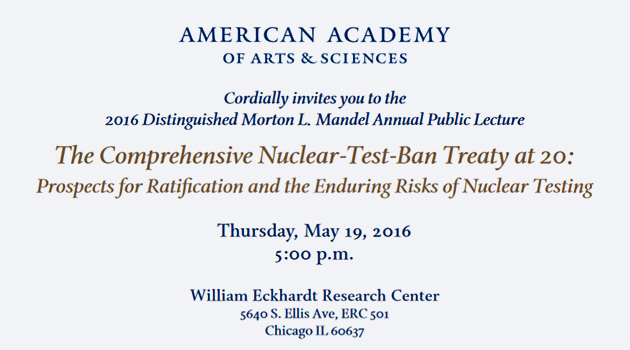 "The Comprehensive Nuclear-Test-Ban Treaty at 20: Prospects for Ratification and the Enduring Risks of Nuclear Testing" Twenty years after the signing of the Comprehensive Nuclear-Test-Ban Treaty (ctbt) and creation of its accompanying organization, the Comprehensive Nuclear-Test-Ban Treaty Organization (ctbto), the ctbt remains extremely relevant in the context of nuclear proliferation, deterrence, testing, and more. Yet challenges also remain that impede the ratification of the treaty and its entry into force. On Thursday, May 19, 2016, the American Academy invites you to participate in a discussion on nuclear testing and the prospects of the ratification of the Comprehensive Nuclear-Test-Ban Treaty. Participants at the University of Chicago will watch a livestream of a panel discussion held at the American Academy's headquarters in Cambridge, MA, featuring the speakers listed below. Following the panel discussion, Rachel Bronson will moderate a dynamic discussion at the University of Chicago. Lassina Zerbo Executive Secretary, Preparatory Commission for the Comprehensive Nuclear-Test-Ban Treaty Organization Rose E. Gottemoeller Under Secretary for Arms Control and International Security, U.S. Department of State Robert Rosner William E. Wrather Distinguished Service Professor in the Departments of Astronomy & Astrophysics and Physics, and the Enrico Fermi Institute and the Harris School of Public Policy Studies, University of Chicago Siegfried Hecker Senior Fellow, Freeman Spogli Institute for International Studies; Research Professor of Management Science and Engineering, Stanford University Arun Rath Correspondent, npr and wgbh Rachel Bronson Executive Director & Publisher Bulletin of the Atomic Scientists Featuring Related Links: KICP Members: Robert Rosner Windy City Physics Slam: Where Particle Physicists Collide August 7, 2016 | 3:00 PM Website Come see five particle physicists from around the world put on a show about the mysteries of the universe. In a high-energy competition, they'll share the mysteries of dark matter and dark energy, shine a light on ghostly neutrinos, and uncover the very structure of the universe. Host Tom Skilling, WGN-TV chief meteorologist Featured Speakers
Read more >> Related Links: KICP Members: Daniel Hooper 2016 Leon Lederman Lecture: Rocky Kolb, "The Mysterious Dark Universe" October 24, 2016 | 3:30 PM | Illinois Institute of Technology Website Edward W. "Rocky" Kolb of the University of Chicago will give the 2016 Leon Lederman Lecture in Physics on Monday, October 24 from 3:30-5 p.m. in the Robert A. Pritzker Science Center, Room 111. Kolb is the Arthur Holly Compton Distinguished Service Professor of Astronomy & Astrophysics at Chicago. The eminent cosmologist studies the application of elementary particle physics to the very early universe. In his lecture "The Mysterious Dark Universe," he will explore how the answer to the question of what the universe is made of is not simple. Astronomical observations tell us that 95 percent of the universe is missing. Most of the mass of the universe is in a mysterious form known as dark matter, and most of the energy in the universe is in an even more mysterious form known as dark energy. Dark matter and dark energy will determine the ultimate fate of our universe, Kolb says; understanding the nature of the dark universe is the biggest challenge facing cosmology today. Kolb is a member of the Enrico Fermi Institute and the Kavli Institute for Cosmological Physics at Chicago, as well as dean of physical sciences. In 1983, he helped to found the Theoretical Astrophysics Group and in 2004 was the founding director of the Particle Astrophysics Center at Fermi National Accelerator Laboratory. He is a fellow of the American Academy of Arts and Sciences and the American Physical Society, among many other awards and honors. In addition to over 200 scientific papers, he is a co-author of The Early Universe, the standard textbook on particle physics and cosmology. Read more. "Rocky Kolb is an excellent and accomplished astro-particle physicist with an outstanding ability to make complex concepts understandable to the public,� said Grant Bunker, chair and professor of physics. The lecture is sponsored by the Department of Physics and honors physicist Leon Lederman, who won the Nobel Prize in Physics in 1988 with Melvin Schwartz and Jack Steinberger and was the Pritzker Professor of Physics at Illinois Tech from 1992-2012. Members of the physics faculty and others have pledged money to permanently endow the Lederman lecture. Read more >> Related Links: KICP Members: Edward W. Kolb Cafe Scientifique: Dan Scolnic, "Tension in the Universe: Dark Energy, Dark Matter & Different Numbers" October 24, 2016 | 7:00 PM | The Map Room, 1949 N. Hoyne Dear Cafe Denizens, As we transition from summer into fall, I am happy to announce our autumn cafe scientifique and an astronomy related movie screening. "Tension in the Universe: Dark Energy, Dark Matter & Different Numbers" Dan Scolnic Time & Date: 7-9 PM Monday October 24, 2016 Location: The Map Room, 1949 N. Hoyne (Free, Limited to first 50 Attendees) (others can join the cafe email list at - Cafe Email list: http://tinyurl.com/cafelist ) Related Links: KICP Members: Daniel M. Scolnic Argonne OutLoud: Clarence Chang, "To the ends of the Earth...and the beginning of the cosmos" October 27, 2016 | 6:30 PM | TCS Conference Center, ANL Website The depths of the cosmos can only be matched by the innumerable questions we have about it. Scientists have attempted for hundreds of years to gain a clear picture of how the universe was formed. Our current understanding of it is the best so far, but there is still so much more to know. But just how do researchers study the beginning the universe? Physicist Clarence Chang (Argonne National Laboratory and Kavli Institute for Cosmological Physics at the University of Chicago) collaborates with a group of researchers using the South Pole Telescope, which is equipped with a unique Argonne-made sensor technology to measure and characterize thermal radiation signatures generated billions of years ago. He will also provide highlights of his research travels to the Antarctica and the South Pole. Read more >> Related Links: KICP Members: Clarence L. Chang Physics colloquium: Elisabeth Krause, Stanford University/SLAC, "Dark Energy Science with the Dark Energy Survey, and Beyond" November 3, 2016 | 4:00 PM | KPTC 206 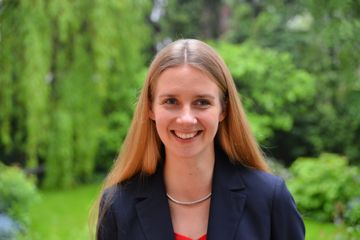 |


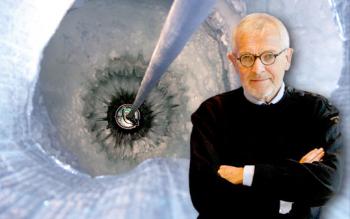
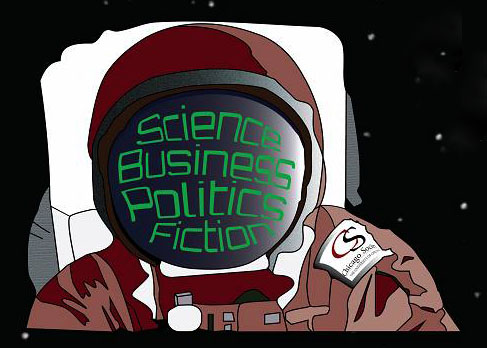
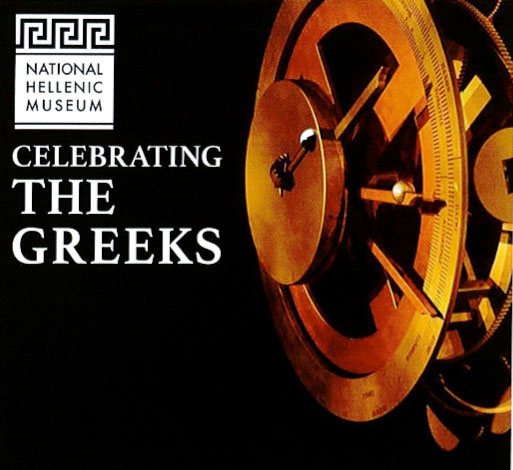
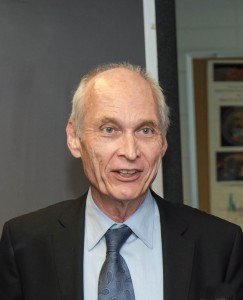
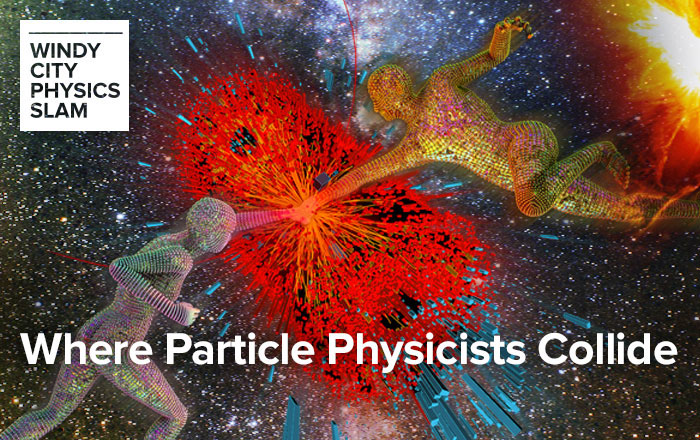
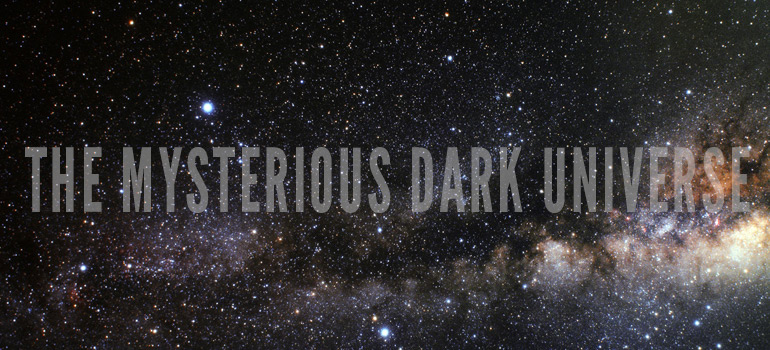
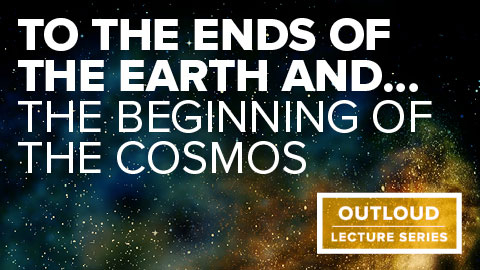



 Overview
Overview